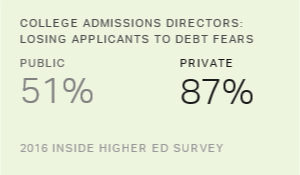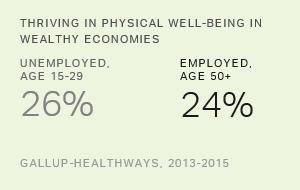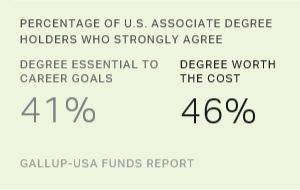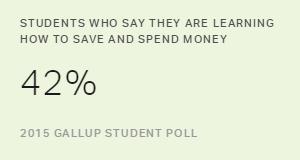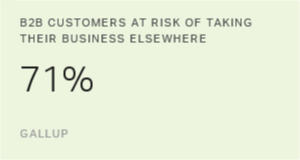Student loan debt could end up costing higher education in the U.S. for a long time. Findings from The 2016 Inside Higher Ed Survey of College & University Admissions Directors provide insight into how institutions of higher education are dealing with enrollment issues amid continued concerns about the rising cost of postsecondary education. The majority of admissions directors surveyed say their institution is losing potential applicants because of the applicants' concerns about accumulating student loan debt.
| All | Public | Private | |||||||||||||||||||||||||||||||||||||||||||||||||||||||||||||||||||||||||||||||||||||||||||||||||
|---|---|---|---|---|---|---|---|---|---|---|---|---|---|---|---|---|---|---|---|---|---|---|---|---|---|---|---|---|---|---|---|---|---|---|---|---|---|---|---|---|---|---|---|---|---|---|---|---|---|---|---|---|---|---|---|---|---|---|---|---|---|---|---|---|---|---|---|---|---|---|---|---|---|---|---|---|---|---|---|---|---|---|---|---|---|---|---|---|---|---|---|---|---|---|---|---|---|---|---|
| % | % | % | |||||||||||||||||||||||||||||||||||||||||||||||||||||||||||||||||||||||||||||||||||||||||||||||||
| Yes | 72 | 51 | 87 | ||||||||||||||||||||||||||||||||||||||||||||||||||||||||||||||||||||||||||||||||||||||||||||||||
| No | 28 | 49 | 13 | ||||||||||||||||||||||||||||||||||||||||||||||||||||||||||||||||||||||||||||||||||||||||||||||||
| The 2016 Inside Higher Ed Survey of College & University Admissions Directors | |||||||||||||||||||||||||||||||||||||||||||||||||||||||||||||||||||||||||||||||||||||||||||||||||||
| Gallup | |||||||||||||||||||||||||||||||||||||||||||||||||||||||||||||||||||||||||||||||||||||||||||||||||||
Those concerns are rooted in sobering statistics. More than seven in 10 recent four-year college graduates have student loan debt. The nearly $1.3 trillion in outstanding student loan debt is shared across 43 million borrowers and exceeds credit card and auto loan debt in the U.S. The average debt load for graduates now tops $30,000 and is nearly triple the average debt load in the early 1990s. While the total average borrowed for a bachelor's degree has skyrocketed, the average family income has not. Family incomes have been flat since 2000, and many are struggling economically, so while graduates may have a higher chance of avoiding unemployment and getting a better-paying job than their peers who don't have a postsecondary degree or certificate, they can expect to pay higher tuition and pay longer for that credential than did previous generations. In addition, for some jobs, such as teaching, graduates can't expect much higher wages than earlier generations.
Private colleges are feeling the effects of student debt concerns more acutely than public institutions. Nearly nine in 10 private college admissions directors say they are losing potential applicants because of student loan debt concerns, while half (51%) of public institution admissions directors say the same. The difference is at least partly related to the greater affordability of publicly funded institutions. Admissions leaders' perspectives are likely influenced by the cost of attending the institution relative to the loan debt amount. The average tuition for four-year private nonprofit institutions is now more than $30,000 per year, whereas the average tuition at four-year public institutions for in-state residents is just over $9,000. Two-year public institutions are even more affordable at just over $3,000 per year, but still, a significant minority (45%) of admissions directors at community colleges say they are losing potential applicants because of loan debt concerns.
These results are based on The 2016 Inside Higher Ed Survey of College & University Admissions Directors. Gallup conducted the survey Aug. 3-Sept. 6, 2016, receiving 339 responses from college and university admissions directors and enrollment officers in the U.S. Gallup statistically weighted the sample based on key institution characteristics to ensure it is representative of the views of admissions directors at colleges nationwide.
Private Nonprofit College Admissions Directors More Likely to Approve Higher Debt
Though the majority of directors of admissions surveyed say the current environment of escalating student loan debt is affecting their applicant pool, many think that accumulating significant loan debt amounts is reasonable: Overall, 24% of admissions directors say $30,000 or more is a reasonable amount of loan debt for an undergraduate student to accumulate over a four-year period.
There are significant differences between what public and private nonprofit college admissions directors say are reasonable debt levels. Private college admissions directors are five times as likely as their peers in public institutions (35% vs. 7%) to say that $30,000 or more is an appropriate level of debt to accumulate. Conversely, public college admissions directors are five times as likely as their private college peers (28% vs. 5%) to say that less than $10,000 is a reasonable loan debt to accumulate over four years. Overall, majorities of public and private college admissions directors say a reasonable loan debt to accumulate over four years is less than $30,000 -- less than the average debt accumulated by recent graduates.
| All | Public | Private | |||||||||||||||||||||||||||||||||||||||||||||||||||||||||||||||||||||||||||||||||||||||||||||||||
|---|---|---|---|---|---|---|---|---|---|---|---|---|---|---|---|---|---|---|---|---|---|---|---|---|---|---|---|---|---|---|---|---|---|---|---|---|---|---|---|---|---|---|---|---|---|---|---|---|---|---|---|---|---|---|---|---|---|---|---|---|---|---|---|---|---|---|---|---|---|---|---|---|---|---|---|---|---|---|---|---|---|---|---|---|---|---|---|---|---|---|---|---|---|---|---|---|---|---|---|
| % | % | % | |||||||||||||||||||||||||||||||||||||||||||||||||||||||||||||||||||||||||||||||||||||||||||||||||
| No amount of loan debt is reasonable | 2 | 2 | 0 | ||||||||||||||||||||||||||||||||||||||||||||||||||||||||||||||||||||||||||||||||||||||||||||||||
| Under $5,000 | 3 | 5 | 2 | ||||||||||||||||||||||||||||||||||||||||||||||||||||||||||||||||||||||||||||||||||||||||||||||||
| $5,000 to less than $10,000 | 10 | 21 | 3 | ||||||||||||||||||||||||||||||||||||||||||||||||||||||||||||||||||||||||||||||||||||||||||||||||
| $10,000 to less than $20,000 | 23 | 37 | 15 | ||||||||||||||||||||||||||||||||||||||||||||||||||||||||||||||||||||||||||||||||||||||||||||||||
| $20,000 to less than $30,000 | 39 | 27 | 45 | ||||||||||||||||||||||||||||||||||||||||||||||||||||||||||||||||||||||||||||||||||||||||||||||||
| $30,000 to less than $40,000 | 16 | 7 | 21 | ||||||||||||||||||||||||||||||||||||||||||||||||||||||||||||||||||||||||||||||||||||||||||||||||
| $40,000 to less than $50,000 | 6 | 0 | 10 | ||||||||||||||||||||||||||||||||||||||||||||||||||||||||||||||||||||||||||||||||||||||||||||||||
| $50,000 or more | 2 | 0 | 4 | ||||||||||||||||||||||||||||||||||||||||||||||||||||||||||||||||||||||||||||||||||||||||||||||||
| The 2016 Inside Higher Ed Survey of College & University Admissions Directors | |||||||||||||||||||||||||||||||||||||||||||||||||||||||||||||||||||||||||||||||||||||||||||||||||||
| Gallup | |||||||||||||||||||||||||||||||||||||||||||||||||||||||||||||||||||||||||||||||||||||||||||||||||||
While increasing college costs and student loan debt are complex issues that must be addressed, nearly three of four bachelor's degree holders still agree that their education was worth the cost. This underscores the need for leaders in higher education institutions -- as well as K-12 education leaders -- to build students' career and financial literacy skills so that they can make informed choices about their future. Students need information and support to help minimize their debt load and complete their degree as expeditiously as possible. This kind of higher education experience can be a gateway to a great job and a great life, but the wrong experience can be financially, and maybe even physically, devastating. Enrolling in the right higher education institution is important for students to maximize the return on their higher education investment and is an important step for living their best life.
